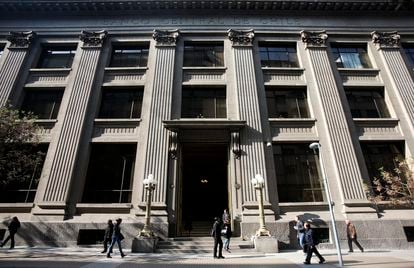General view of the Central Bank of Chile in Santiago, Chile.EFEI0499
The Central Bank of Chile voted this Wednesday to raise its monetary policy rate by 75 basis points to reach 9.75%.
This is the highest level since 2001, when the institution began to nominalize the instrument in order to contain inflation.
This is the rate at which the Central Bank lends to commercial banks and is used, at the same time, as a reference in the rest of the financial system.
Wednesday's rise is the ninth in a row since the end of July 2021, when inflation began to skyrocket.
The decision comes after the Federal Reserve in the United States also raised its rate by 75 basis points, which has tightened global financial conditions.
Inflation, a disease that afflicts most countries in the world, derives partially from global factors such as the rise in cases of covid-19 in China and the war in Ukraine.
In Chile it reached 12.5% in June, its highest level since 1994.
"The macroeconomic scenario presents elevated risks," says the statement issued by the bank on Wednesday.
"The deterioration of global financial conditions has been faster and more intense than expected, reducing the price of raw materials and the market outlook for global growth," the text adds.
The country is a major exporter of copper, whose value on international markets has fallen by around 22% this year, due to the expectation of a recession in developed countries.
According to an analysis by investment bank Mizuho, the Chilean peso has depreciated 19% against the dollar since mid-June, when the Fed raised interest rates.
This has placed the currency as the world's worst performer along with the Colombian peso and the Russian ruble.
This sharp depreciation of the currency "will cause an additional rise in domestic prices" in the short term, says the central bank statement.
“The Board estimates that there will be new increases in the monetary policy rate to ensure the convergence of inflation to 3% in two years.
Its magnitude will depend on the implications of the evolution of the scenario for the achievement of the inflation target”, he adds.
Inflation has been seen across the board, but price increases for air passenger transport have been particularly high, rising 104% in the past 12 months.
Food consumed outside the home has also increased by almost 17%.
The Government of President Gabriel Boric announced on Tuesday a bonus of about 120 dollars for the most vulnerable in the country to help them cope with the increase in prices.

